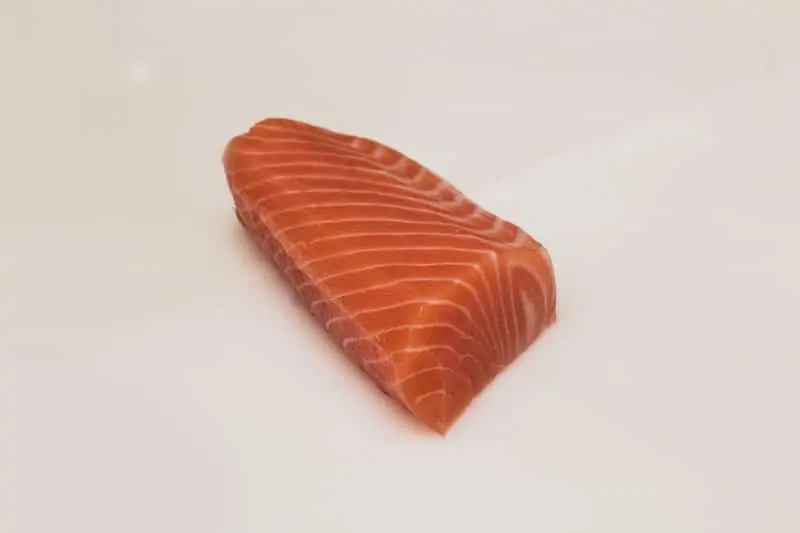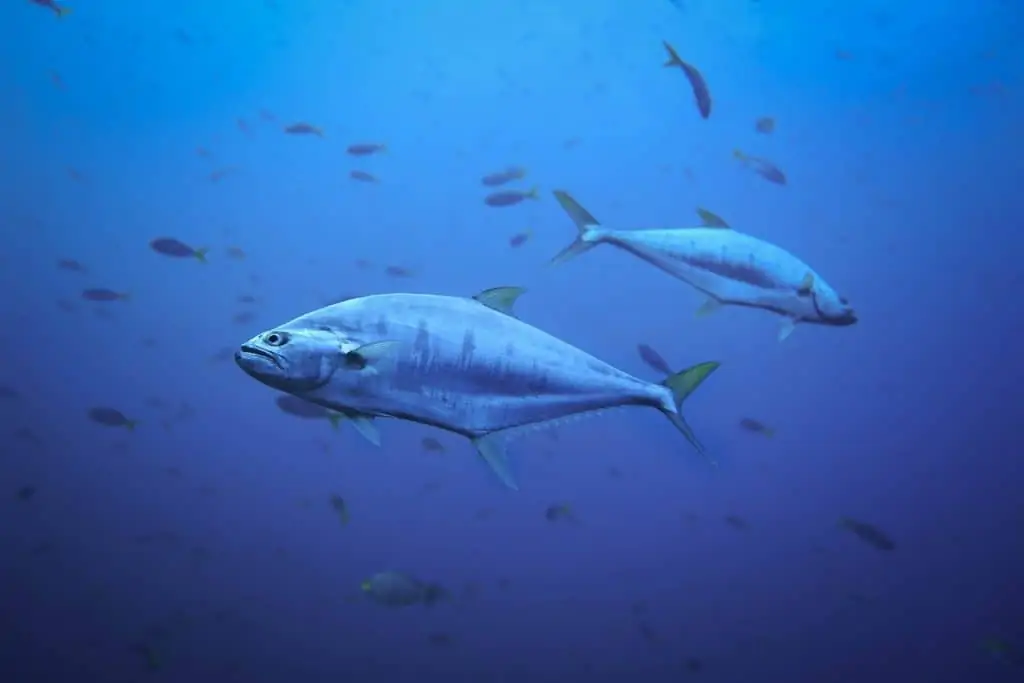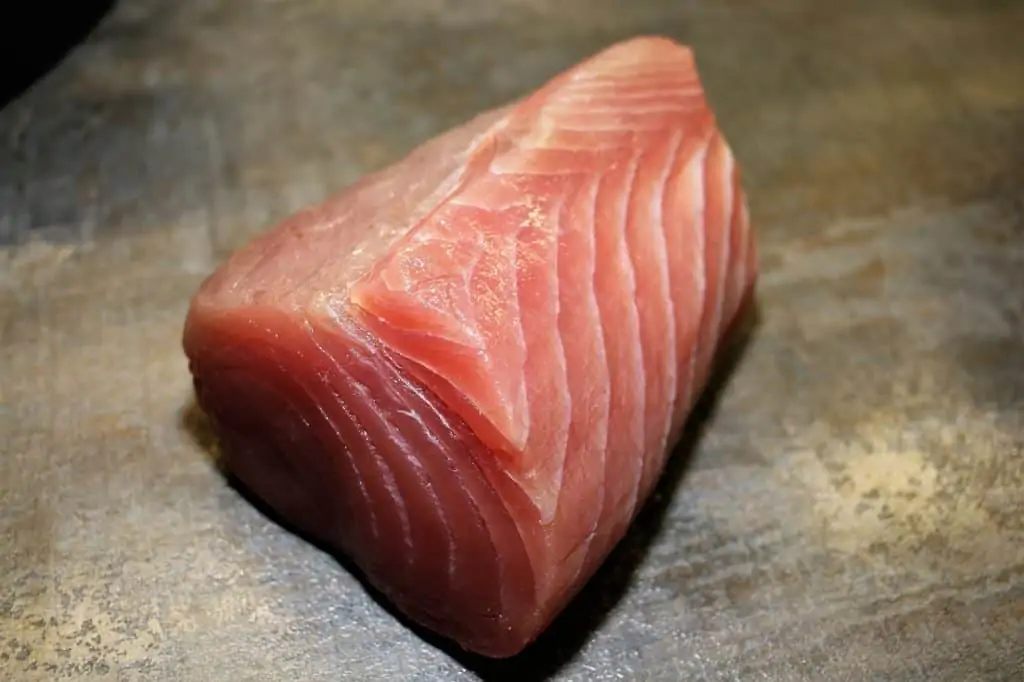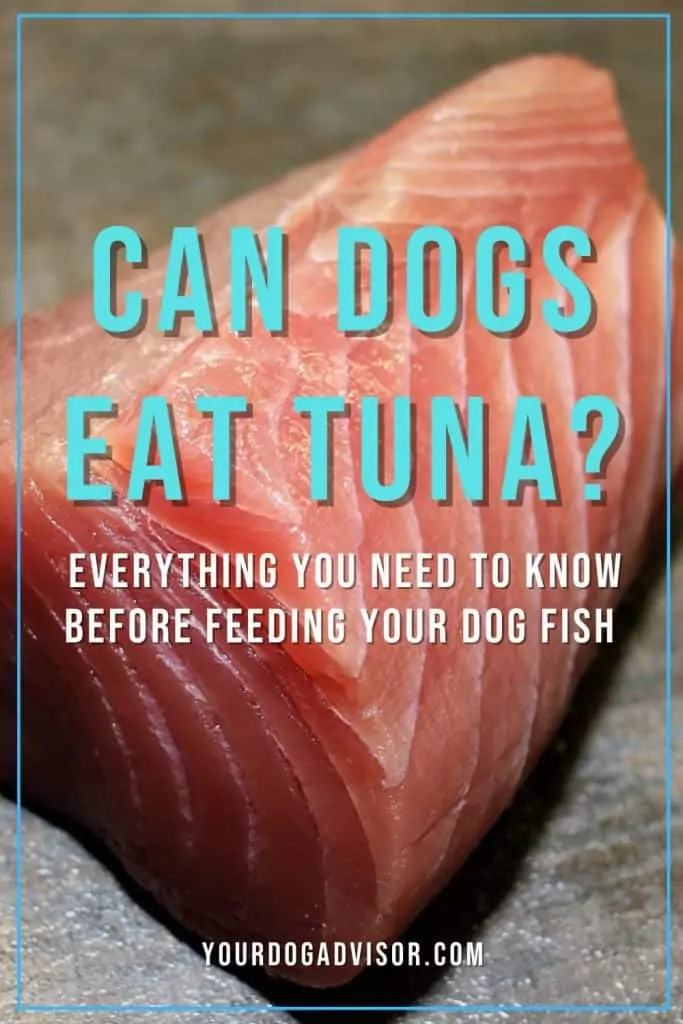Fish is a tasty ingredient in a number of human foods, and since fish is often found in a variety of dog foods as well, it’s no wonder you’re here asking yourself can dogs eat tuna.
If your dog has just stolen a piece of tuna from your plate while you weren’t looking, don’t worry – a small amount of tuna will not hurt your dog.
But can dogs eat tuna in abundance? The answer is no. Consuming too much tuna can lead to a number of health issues in your canine counterpart that could be devastating and even deadly.
So then what types of fish are safe for dogs to eat? And why is the answer to can dogs eat tuna such a resounding no?
That’s what we’re here to find out.
Contents
Can Dogs Eat Tuna? Understanding What Tuna Fish Is
Tuna is a saltwater fish that is known to be high in mercury
Can dogs eat tuna? That’s a great question.
Tuna is one of the most widely consumed fish species in the world. This saltwater fish lives in our oceans with a habitat that ranges from the Atlantic Ocean to the waters of Indonesia.
This large fish belongs to the tribe Thunnini, which is a subgroup of the mackerel family. There are 15 different species of Tuna, but the most commonly consumed species are yellowfin tuna, albacore tuna, and skipjack tuna. All three of these tunas are commonly found in popular dishes, including canned tuna you can buy in abundance at your local grocery store.
Some species of tuna like the bluefin tuna have been recorded to live longer than 35 years. However, the average lifespan of a typical tuna fish is around 15 years.
Tuna is also a massive fish, with some species weighing over 2,000 pounds and growing up to 15 feet in length!
While the answer to can dogs eat tuna is generally no, this fish can be quite healthy for humans when consumed in moderation.
Tuna is rich in vitamin B12, and it also contains essential omega-3 and omega-6 fatty acids, and LDL cholesterol. Consuming tuna in moderation can help reduce the risk of cancer in some people, while also helping promote healthy vision, decrease chances of obesity, and more.
Unfortunately, tuna is also a saltwater fish that comes with its fair share of dangers, especially if it is consumed in large quantities. That’s why we’re glad you’re here asking “can dogs eat tuna.”
Keep reading to learn more.
Can Dogs Eat Tuna? Why Most Experts Say No.
A small amount of canned tuna will not hurt your dog, but it’s best dogs don’t eat tuna.
If you’re asking yourself “can dog eat tuna”, chances are you’re familiar with all the nutritional benefits a diet that includes fish and seafood can have.
While it is true that many dog foods contain fish, you’ll likely be hard-pressed to come across a dog food that contains tuna.
So, can dogs eat tuna? The answer is no, but that certainly doesn’t mean you should panic if your dog has just stolen a bit of tuna off your plate. Unlike chocolate, xylitol, grapes, or garlic, tuna is not toxic to dogs in small amounts.
A small bite of tuna here and there is likely safe for your pup.
However, large amounts of tuna can lead to mercury poisoning in dogs, which can be devastating and sometimes even deadly.
All fish and ocean life can be susceptible to carrying mercury, including other popular fish like salmon, herring, and whitefish. However, the larger the fish and the longer a fish lives, the more mercury it can carry in its tissue.
Remember, tuna is a long-lived fish that can sometimes grow to be up to 15 feet in length. For this reason, tuna is found to have a very high mercury level.
Even humans should be cautious about how much tuna they eat, with most health experts recommending that people consume tuna in measured amounts based on their weight.
For dogs, who are much smaller than human beings, consuming tuna could be very dangerous, so experts recommend you just say no when asked can dogs eat tuna.
Of course, remember it’s not the tuna that is toxic to dogs. It’s the level of mercury tuna has in its tissue.
What Is Mercury And How Does Mercury Poisoning Occur?
Mercury is a toxic heavy metal that gets into our oceans and can be found in the tissue of sea life.
One of the main reasons the answer is no to can dogs eat tuna is due to the high levels of mercury tuna contains.
Mercury is a heavy metal that is incredibly toxic in large amounts. Mercury can get into ocean water and groundwater in a number of ways. Sometimes it gets into the water via industrial waste, or through mining waste from coal.
In fact, mercury is a naturally occurring mineral that is often found in the earth, so it can also find its way into water through natural elements like rain.
While tuna does have a strong level of mercury, the good news is that mercury poisoning in humans is quite rare. In fact, only a handful of cases have been reported of mercury poisoning in the United States.
Still, out of an abundance of caution, it’s recommended that pregnant women, nursing mothers, and small children should avoid tuna or at least limit the amount of tuna they consume each week.
This is especially true when it comes to albacore tuna, which is one of the largest species of tuna found in the ocean. But what about our pets? Can dogs eat tuna in small amounts?
While a tiny nibble of tuna is not likely to harm your dog, a large enough quantity of tuna could be toxic. If you’re concerned your dog has eaten an abundance of tuna, watch out for signs of mercury poisoning.
Mercury poisoning in dogs can lead to serious damage to the kidneys, cardiovascular system, central nervous system, renal glands, digestive tract, kidneys, and more.
Understanding How Do Dogs Can Get Mercury Poisoning
We know the answer to can dogs eat tuna is no due to the high levels of mercury found in tuna fish, but we should also note here that mercury poisoning can occur in other ways as well.
Some other common causes of mercury poisoning in your dog could include:
- Exposure to soil with high levels of mercury
- Inhaling toxic fumes from burning garbage or oil that contains mercury
- Consuming products with latex paint
- Swallowing or chewing glass thermometers
- Chewing fluorescent light bulbs
- Swallowing button batteries
- Or chewing light-up sneakers (the kind commonly worn by children)
We should also note that there are two types of mercury poisoning in dogs, including acute mercury poisoning and chronic mercury poisoning.
Acute Mercury Poisoning
Acute mercury poisoning in a dog could occur if your dog gets hold of a very large amount of tuna with high levels of mercury in one sitting, or if your dog chews a glass thermometer. This could lead to acute symptoms that come on quickly in a short period of time.
Chronic Mercury Poisoning
Chronic mercury poisoning that could result from a dog eating tuna means the poisoning happened over time. This could mean your dog has been eating small amounts of tuna daily or at least often enough for the heavy metal to build up in his system.
Some dogs can develop chronic mercury poisoning from eating their cat sibling’s food. Although cats are also susceptible to mercury poisoning, there are brands of cat food that contain tuna. If your dog gets into this food and consumes this tuna often enough, he could begin to show signs of chronic mercury poisoning.
Both acute mercury poisoning and chronic mercury poisoning are cause for concern and require the immediate care of a veterinarian.
Some Of The Most Common Symptoms of Mercury Poisoning In Dogs Include:
- Blindness
- Hair Loss
- Anxiety
- Kidney Damage
- Inability To Urinate
- Abdominal Swelling
- Loss Of Feeling In The paws
- Loss Of Coordination
- Vomiting Blood
- Blood In Diarrhea
- WateryDiarrheaa
- Fur Loss and Patchiness
How To Treat Mercury Poisoning In Dogs
If you are asking can dogs eat tuna because your dog has consumed tuna and you now recognize symptoms of mercury poisoning, it’s important to get your dog into his veterinarian right away.
Unfortunately, diagnosing mercury poisoning in a dog can be difficult, but if you suspect your dog has been exposed to mercury in one way or another, it’s a good idea to bring this up during your check-up if your dog is exhibiting symptoms.
If mercury poisoning is diagnosed in your dog, treatment could vary. Some dogs require hospitalization, antibiotic treatments, inflammatory medications, oxygen therapy, IV fluids, and more. Veterinarians may also try using activated charcoal as an effective way to help remove mercury that is currently still in the system.
Sadly, the damage caused by mercury poisoning is irreversible. If your dog has suffered from severe mercury poisoning, your veterinarian may speak with you regarding options moving forward based on your unique situation and your dog’s potential for a good quality of life.
The good news is that keeping your dog away from mercury is relatively simple once you know where mercury is lurking and once you realize that the answer to can dogs eat tuna is no.
But just because the answer to can dogs eat tuna is no doesn’t mean that the answer to can dog eat fish is also no. In fact, there are plenty of types of fish that are quite healthy for dogs.
Let’s take a look now at the advantages of providing the proper fish to your dog in healthy moderation.
The Pros of Feeding The Right Types Of Fish To Dogs
Feeding your dog the right kinds of fish could be beneficial to his health.
Can dogs eat tuna or should they stick with other fish?
Well, based on everything we’ve learned above, we know it’s best that dogs stay away from tuna. Luckily, there are other types of fish that have low levels of mercury. Furthermore, consuming these types of healthy fish can have great benefits for dogs.
One of the biggest benefits of offering your dog fish once in a while or providing your dog with dog food that already contains a safe type of fish is the naturally occurring omega-3 fatty acids.
Omega-3 fatty acids have a number of health benefits for your dog. They offer natural anti-inflammatory components that can help improve digestion, relieve or reduce joint damage and pain, help promote your dog’s overall coat health, and can even reduce allergies and itchy skin!
Which Types Of Fish Can Your Dog Eat Safely?

Salmon is a safe fish for dogs to consume and providing it to your dog can have benefits to his heart and coat.
Can dogs eat tuna if it’s not albacore tuna?
While albacore tuna does contain the highest levels of mercury, it’s still a good idea to steer clear of tuna altogether when it comes to your dog.
If you’re looking for a quality fish you can cook up for your pup, try offering him a fish with lower levels of mercury. Some of the safest types of fish dogs can benefit from in their daily diet include:
- Salmon
- Flounder
- Whitefish
- Herring
- Cod
- Trout
- Sardines
- And Catfish
There are some sources that also list canned tuna in moderation as being safe for dogs. Remember, can dogs eat tuna in small amounts? Yes. But it’s really best to keep tuna out of your dog’s diet altogether.
For this reason, we say it’s best to avoid canned tuna as well.
When Making Fish For Your Dog – Tips and Tricks
Even though certain types of fish can be healthy for your four-legged friend, remember that even good human foods should be given in moderation.
If you plan to prepare fish for your dog yourself, be sure to cook it without any added oils, seasonings, spices, or grease.
Most fish like salmon and catfish are naturally oily and don’t require much help when it comes to cooking or baking. If you do need to use oil to get your fish cooking, try using olive oil or flaxseed oil.
Can Dogs Eat Tuna – Dog Foods That Contain Fish For Dogs
Many brands of dog food can be made to include ingredients like fish.
The answer to can dogs eat tuna may be no, but there are other types of fish your dog can feast on that will not only help give him his seafood fix, but also help promote healthy bones, joints, muscles, coat, and digestion.
Along with cooking up certain types of fish for your dog at home, you can also look for quality dog foods that contain fish as one of their main sources of protein.
Remember, all dogs do best on a high-quality dog food specified for their age, weight, and activity level. When considering a dog food that contains fish, refrain from choosing a dog food that contains additives, fillers, corn, soy, wheat, or gluten.
Instead, choose dog foods that are rich in real animal protein like salmon, herring, whitefish, or even poultry, beef, or lamb. Quality dog foods should also contain healthy carbohydrates, fatty acids, vitamins, minerals, nutrients, and the food should be a good source of water.
If you’re not sure which type of dog food you should choose when considering can dog eat tuna or other types of fish, we have listed some of our favorites below.
Blue Buffalo Life Protection Dog Food
No products found.
Blue Buffalo is a trusted dog food brand we like because it is made with natural, quality ingredients that dogs love. When asking can dogs eat tuna, we’ve learned that dogs are actually better off consuming other types of fish like salmon or whitefish.
Whitefish is actually the main protein source in the above dog food by Blue Buffalo. Other natural ingredients in this dog food include brown rice, fruits, vegetables, and whole grains.
Real meat is always the first ingredient in Blue Buffalo dog food, and if you’re concerned your dog will not be a fan of the whitefish protein source, you can always order this product in different recipes including chicken, lamb, or beef.
Orijen Dry Dog Food
No products found.
Another dog food we recommend if you’re looking into can dogs eat tuna or other fish is Orijen Dry Dog Food. This high-protein dog food can be purchased as a meal topper, as healthy treats, or as a complete dog food meal depending on how you choose to order it.
The food is high in protein and contains six types of fish that are safe and healthy for dogs to consume. The fish on this list include mackerel, herring, monkfish, Acadian redfish, flounder, and hake.
Stella & Chewy’s Wild Red Ocean Recipe Dog Food
No products found.
Another ocean recipe dog food that utilizes a number of healthy fish types as the main protein source is by the Stella & Chewy brand.
This dog food contains a grain-free recipe that utilizes trout, salmon, mackerel, whitefish, cod, and herring to provide your dog with the nutrients and benefits of fish without the added dangers of mercury we discovered when looking into can dogs eat tuna.
Canidae Petite Limited Ingredient Diet Dog Food
No products found.
For small breed dogs with a more sensitive stomach, we recommend Canidae Petite Limited Ingredient wet dog food. This is a grain-free dog food that contains salmon and shrimp, offering all the benefits of Omega-3 fatty acids in a tasty blend of wet food.
This is excellent dog food for dogs with allergies or sensitivities, and can also be a good choice of food for senior dogs with bone and joint issues. If you’re looking into can dogs eat tuna because you want to offer your dog all the benefits of healthy fish, forgo the tuna and stick with this type of dog food instead.
Purina Beyond Adult Dog Food
No products found.
Purina Beyond Adult Wet Dog Food is another dog food we would recommend to anyone looking into can dogs eat tuna. This dog food is made with Alaskan cod, salmon, and pumpkin. This combination not only provides excellent bone and joint health but also digestive support for picky eaters or those with food sensitivities.
This dog food can be used as a complete meal or you can use it as a healthy meal topper to help encourage dogs to eat and to offer them all the benefits of healthy Omega-3 fatty acids.
Other Ways To Introduce Omega-3 Fatty Acids Into Your Dog’s Diet
Supplements and treats can also provide your dog with a good source of Omega-3 fatty acids.
Now that you’ve learned the truth behind can dogs eat tuna, you may be a bit wary about feeding your dog fish at all. Of course, remember that certain kinds of fish like those listed above can not only be safe for dogs but also beneficial to your dog’s health.
However, if you’re anxious about your dog consuming fish or if your dog is a picky eater that won’t eat dog foods that contain fish, there are other ways you can go about implementing a healthy dose of Omega-3 fatty acids into your dog’s daily diet.
Zesty Paws Salmon Bites
No products found.
Zesty Paws Salmon Bites are something we’ve used personally for our dogs at home. For super picky dogs, you can sprinkle the bites over their food, but we’ve found our dogs are pretty big fans of the bites when they are given as treats.
These bites provide dogs with the health benefits they need from Omega-3 fatty acids. The bites are made with wild-caught Alaskan salmon and help provide healthy hip and joint support, allergy support, and can even help to reduce itchy skin.
Amazing Omega 3 For Dogs
No products found.
One way to get that healthy dose of omega-3 fatty acids into your dog’s system is to forgo feeding him a fishy diet altogether and give him some bacon-flavored chews. Enter the Amazing Omega-3 For Dogs!
This product comes in two recipe types including liver and salmon, and both provide dogs with the nutrients they need to maintain healthy bones, joints, skin, and coat. Each bottle contains 60 tablets and they are made with 100% natural ingredients.
Wild Caught Omega-3 Fish Oil For Dogs
No products found.
Perhaps one of the easiest ways to help your dog get Omega-3 fatty acids into his diet is to simply squirt Omega 3 Fatty Acid fish oils directly into his dog food during mealtime. The above Omega-3 Fish oil for dogs is made with wild-caught salmon fish oil and is rich in DHA and EPA to help reduce shedding, improve bone and joint health, support a healthy heart, and alleviate allergies.
You can order this product in two different sizes, making it perfect for those who live in a multi-dog household.
We also like that this brand specifically states it is low in mercury or other ingredients that could be harmful to your dog’s health. Other fish in the ingredients list include sardines, anchovies, herrings, and mackerel.
So, Can Dogs Eat Tuna? Let’s Sum It Up!
While dogs can eat small amounts of tuna, experts advise against it. (https://pixabay.com/photos/tuna-fish-fillet-tuna-fillet-raw-6568345/)
Can dogs eat tuna?
The answer isn’t as black and white as it may seem. Some sources say the answer to can dogs eat tuna is a yes when it comes to canned tuna or other types of tuna species. However, most experts agree that the answer to can dogs eat tuna should just be no.
Remember, tuna contains a higher level of mercury than most other saltwater fish. And while some species of tuna can contain more mercury than others, it’s best to play it safe and avoid giving tuna to your dog altogether.
Keep in mind that dogs can be exposed to tuna in a number of ways. They can steal a bit of tuna from your plate if you aren’t paying attention, but they might also consume tuna if their feline sibling is eating cat food that contains this large fish as one of the main protein sources.
If you are raising cats and dogs in the same household, we suggest avoiding cat foods that contain tuna as the main protein source. Not only could this be dangerous to your dog, but cats are also susceptible to mercury poisoning as well.
Instead, choose a dog and cat food that contains safe fish like salmon, whitefish, catfish, cod, or any of the other types of fish we listed above.
If you do think your dog has consumed a large amount of tuna or if you suspect your dog may be suffering from mercury poisoning, get them to a veterinarian as soon as possible.
So, what did you learn today about can dogs eat tuna? Did you realize tuna contained such high levels of mercury? Share your thoughts with us about can dogs eat tuna in the comment section below.


Jen Jones is a professional dog trainer and behavior specialist with more than 25 years of experience. As the founder of ‘Your Dog Advisor’ and the ‘Canine Connection’ rehabilitation center, she applies a holistic, empathetic approach, aiming to address root causes rather than merely treating symptoms.
Well known for her intuitive and compassionate approach, Jen adopts scientifically-proven, reward-based methods, encouraging positive reinforcement over punishment. Jen specializes in obedience training, behavior modification, and puppy socialization. Her innovative methods, particularly in addressing anxiety and aggression issues, have been widely recognized. Jen has worked with many of the world’s leading dog behaviorists and in her free time volunteers with local animal shelters and rescue groups.







